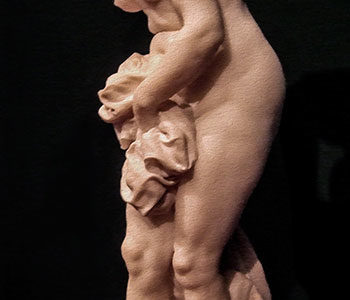WHEN BATHSHEBA makes her first appearance in the Bible, she’s not wearing any clothes.
She’s taking a bath. Outside. Within eyeshot of the very married King David—seven wives at least. He’s strolling around on what was probably the flat roof of his home. Roofs were used much like we use porches and decks.
Bathsheba was married to Uriah the Hittite, a soldier in David’s elite corps known as the Thirty. A three-day march away, Uriah was with the Israelite army, laying siege to the city of Rabbah (near modern Amman, Jordan).
“David sent messengers to get her; and when she came to the palace, he slept with her” (2 Samuel 11:4).
That bath she took was after her menstruation—probably about a week later, since that’s how long a woman had to wait before performing her purification rituals. That put Bathsheba in her fertile period. She got pregnant.
When David got the bad news, he called Uriah home, saying he wanted a war report. Actually, he wanted Uriah to sleep with Bathsheba. No chance. Even drunk, Uriah honored the Jewish tradition of sexual abstinence during war (1 Samuel 21:5). This prods some Bible students to draw the conclusion that Uriah drunk was more righteous than David sober.
David resorted to murder. Uriah carried the secret order himself. He would take a frontline position in an assault on the city, and then commander Joab would pull back the support troops. Uriah and several others died.
Bathsheba observed the mourning rituals, which generally lasted a week, then joined David’s harem.
The prophet Nathan confronted David, vowing that God would not allow this child to live. David admitted his sin, sought God’s forgiveness, and pled for the child’s life. But Bathsheba’s son lived only seven days. Bathsheba, however, gave David four more sons: Shimea, Shobab, Nathan, and Solomon—whom David apparently promised would become the next king.
When the elderly David lay dying, his oldest son—Adonijah—threw himself a coronation party. Bathsheba rushed to David’s bedside and urged him to honor his promise, which he did. Some scholars wonder if David ever made such a promise, though. They wonder if Bathsheba convinced him that he did, as though he had forgotten.
Later, Adonijah asked Bathsheba to intercede for him with Solomon. Since Solomon took what Adonijah thought was his throne, Adonijah asked for at least the right to marry one of David’s secondary wives, a concubine. Bathsheba agreed, perhaps out of ignorance or out of a desire for revenge—knowing what would happen.
Solomon reacted with rage. When a conqueror took a kingdom, he often married the former king’s wives—to prove his authority. Solomon apparently thought his older brother was trying to assert his right to rule. Solomon killed him, and we can only guess if Bathsheba saw it coming.
Excerpt from Who’s Who & Where’s Where in the Bible 2.0.


Ah…family dynamics…as old as time! I did, however, name my son after King Solomon. 🙂